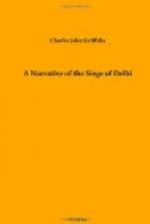It was now quite evident that the baffled insurgents were retiring from Delhi in great numbers, mostly by the south side, few crossing the bridge of boats by day owing to it being commanded by our guns. But on the night of the 19th, when sitting in the church compound watching the shells exploding over the Palace and Selimgarh, we heard distinctly, through the intervals of firing, a distant, confused hum of voices, like the murmur of a great multitude. The sound came from the direction of the river, and was caused by multitudes of human beings, who, escaping by the bridge of boats to the opposite side, were deserting the city which was so soon to fall into our hands.
September 20.—After some sharp fighting, and early on the morning of September 20, the Lahore Gate and Garstin bastion, which during former assaults had cost us the lives of so many men, were taken, the column pushing on along the walls to the Ajmir Gate, which also fell into our hands. There were few defenders at these places, the mass of sepoys having evidently fled into the country; and the troops marched through the streets almost without opposition.
There now remained but the Palace, Selimgarh, and the Jama Masjid, and these were all occupied by our troops on that day. The former seemed almost deserted, an occasional shot from the high walls directed on our defences in the Chandni Chauk being the only signs of animation in that quarter. Powder-bags were brought up and attached, to the great gate, which was quickly blown in; and the 60th Rifles, with some Goorkhas, rushed into the enclosure. A score or two of armed fanatics offered some resistance, but they were soon shot down or bayoneted, and a few wounded sepoys found in the buildings were put to death. Passing through the Palace, Selimgarh was entered, and this, the last fortified position belonging to the enemy, was taken possession of without a struggle.
Meanwhile, a force of cavalry under Hodson moved round outside the city walls, and found a large camp of the enemy near the Delhi Gate. This was deserted, save by some sick and wounded sepoys, who were put to the sword; and the horsemen, riding through the gate, made their way into the heart of the city and took possession of the Jama Masjid without striking a blow.
Delhi had at length fallen into our hands, and the toils and dangers of more than three months were at an end. The principal buildings were occupied by our troops, and guards were placed at each gate with orders to prevent the ingress or egress of any suspicious-looking characters, while parties of armed men patrolled the streets of the city from end to end.
That night we moved back to our old quarters at Ahmed Ali Khan’s house, the 52nd taking our place at the church. The first-named building was a vast structure, belonging to a rich native, and had been furnished in a style of Oriental magnificence; but now nothing but the bare walls and floors were to be seen, the place having been ransacked of its treasures and completely gutted since our last occupancy.




